On May 5, 2003, Erica Walz conducted a lengthy interview with Tori Woodard and Patrick Diehl at their home in Escalante, Utah. Both Woodard and Diehl are actively involved in Utah public lands issues and have been vocal opponents of public lands ranching. They were key players in the creation of the Glen Canyon Group of the Sierra Club and Patrick ran for the US Congress in 2002 on the Green Party ticket.
The interviewer, Erica Walz, lives in Escalante, Utah
Erica: Tori and Patrick, what are your backgrounds and what led you to move to one of the most remote rural communities in Utah?
Patrick: The reason I moved here is because of Tori’s health. At the end of the eighties she developed Multiple Chemical Sensitivity syndrome, and could no longer live in urban areas. I lived in the Bay Area and she couldn’t. We knew what would work for her as far as not getting worse: high desert and clean air. We talked about where we could find those things, and where we could also hike year round; there aren’t many places in the West that met our criteria, and we settled on Escalante. I’m trained as an academic. I’ve been a political activist for 20 years, an anti-nuclear activist, and now I do a lot of free-lance work with words, essentially. My favorite place when growing up was in southwest Texas–my grandparents’ ranch. So there actually is ranching in my background. I like the West.
Tori: I was raised on a ranch in the San Luis Valley in Colorado. I have an MA in clinical psychology from Antioch University in San Francisco. I was working on an internship to get my license when I got sick, and since then I’ve supported myself pretty much the same way Patrick does summarizing testimony, writing grant proposals for a number of organizations. I was an anti-nuclear activist for the same period of time Patrick was–that’s how we met.
Erica: What are your objections to public lands ranching?
Tori: Since I’m the daughter of a public lands rancher maybe I should go first. My dad and his family, going back five generations, were ranchers including on public lands since the 1860s. We had a large base: 26,000 acres private and 100,000 acres on BLM & Forest Service. That amount of property supported a herd of 1,000 cows. It’s a lot of land for that number of cows, and there was a lot more grass there than here. But I didn’t really think about public lands ranching until I got here. I learned about cryptobiotic soils, and hiking around here I could see that the ecosystem is in better shape where the cows can’t go. And then I began to learn about all the subsidies that ranchers get that I wasn’t aware of as a kid. Total life support. I also learned that we’re not feeding the country on cows raised on this land. It’s negligible. So I feel like the cost is so high compared to what we get out of it. And I get so upset about the rancher attitude toward wildlife, mountain lions, coyotes—they want to kill them all. They persecute these animals. That’s another cost. My family really didn’t know about ecosystems. I think families lived that way because they didn’t know, but there’s no point given what we know now to not do better. I think it’s really wrong. There are ranchers that try to do the right thing, to develop conservation easements. So I do think there is a spectrum. But what we have here is an extreme, and it’s polarizing—it’s polarized me. If I hadn’t moved here I’d probably be somewhere in the middle.
Patrick: I’m convinced that domestic livestock do not belong on public land in the intermountain west, period. Cattle, sheep and goats don’t belong here. The ecosystems did not evolve to tolerate that kind of pressure from ungulates and grazers.
Erica: Is there a value in keeping people connected to land and in agriculture?
Patrick: Having grown up around my uncles around the ranch in Texas, the connection to the land was kind of qualified. They were connected to the business of running the ranch and to killing predators, and they knew about the plants they liked and didn’t like, but they didn’t have a connection as far as a love of the land and an interest in how it functions as a whole. I see that here. I don’t have the impression that the people in this town know very much at all about the land around them. They have a very narrow knowledge of a few things that are of practical relevance in their lives, so I’m not convinced that family ranching and family farming fosters a valid connection to the land. It’s just as rare for ranchers and farmers to be passionately interested in the land around them as it is for the general population.
Tori: Patrick and I are talking about a land ethic. Another thing I’d like to add is I think we all need to grow our own vegetables. But when you begin to try to make money off the land, extracting something from the land, that perverts the whole process. If you have to make your living at it, you’re going to look at everything you can to increase yields, such as use pesticides, and it becomes exploitative.
Erica: Define, from your perspective, the” highest and best use” of water and land. For example, if 100 condominiums on 100 acres of land use half as much water as it takes to water that much alfalfa, does that make condominiums a higher and better use?
Patrick: Well, I’m not in a position to control land that someone might want to put 100 condos on. It’s up to the local community to either stop it or not, and I could perhaps campaign to return the water that was used for that land back to it’s natural role as a support for ecosystems, but I’m not interested in 100 condos or an alfalfa field. Neither is an acceptable use.
Erica: You’ve said that you’d like to “eliminate every alfalfa field in southern Utah.”
Patrick: Did I say that? I don’t know about every alfalfa field. But alfalfa farming in desert conditions requires heavy subsidies and should stop. Alfalfa fields are competing with the streams, and I’m interested in getting in-stream flows back up. We don’t need the alfalfa that’s produced. Society doesn’t need it. It simply is not an important contribution. We need to assess the costs and benefits of a lot of our society’s activities, and this is one that needs to be challenged.
Erica: If there isn’t alfalfa farming, what do you see as taking its place?
Tori: It really depends on the place. What is the best and highest use—what land are we talking about? Some land is obviously good agricultural land…bottom land. You can divert some of the water for crops for human consumption, but it shouldn’t be for livestock consumption. Another thing I’d like to see is native hay grown instead of alfalfa. It doesn’t take as much water.
Erica: You’ve talked about a “New Economy” for rural Utah. What do you mean by that?
Tori: That idea was from a few years ago.
Patrick: The “amenities economy” idea that the Wilderness Society was putting out is what I think lies behind that. There’s still a fair amount of merit to this concept. Between the extractive economy and the purely touristic economy is a third way in which you have people moving to an area to live there and be part of the local society and perhaps the local economy–in many cases bringing their jobs with them and telecommuting–and the reason people come there is because it’s a beautiful place to live. It’s not going to be healthy and beautiful if you degrade it through logging and mining and grazing. It involves replacing some of the extractive economies. But I’m much less confident in the future of this economy than I was four years ago when we moved here, and I also see that the savagery of the local resistance exceeded even my expectations. People will go very far to make their area be extremely unattractive to outsiders. It has to do with political power. If you let outsiders in, if you allow them to organize and voice their point of view you can easily lose control. These small towns have a lot to lose from a political standpoint if there’s much influx from outside. So the chances of actually getting an amenities economy going in southern Utah is very bad in the short run because of the political situation.
Erica: You’ve also said that one possible job created by this New Economy would be putting people to work cutting and eliminating tamarisk. Do you see rural Utahns going to work on projects like that?
Both: Oh sure. If they were paid for it.
You’ve said that Southern Utah is “grossly underpopulated.”
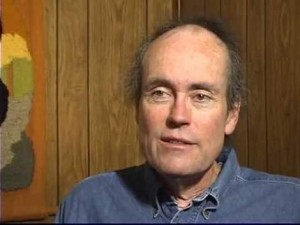 Patrick: “Grossly?” Maybe “somewhat.” I think a lot of these qualifiers are Jim’s. (Stiles)
Patrick: “Grossly?” Maybe “somewhat.” I think a lot of these qualifiers are Jim’s. (Stiles)
Tori: I think you did say that. That sounds like something I remember you saying.
Patrick: I think this town needs to double in size. If we’re going to have more towns in this part of the world they should be more self-sustaining. They’re really untenable. Not just in economic terms but as cultural units. Maybe 50 or 100 years ago when they were cut off from the outside world they had to create their own culture, but right now it feels like the further reaches of Provo to me–it’s nothing, in itself.
Erica: What about people who enjoy it the way it is?
Patrick: I can’t imagine enjoying it. I really loathe this town, and you can quote me. Socially it’s a really loathesome place. You can put that in the paper. Absolutely. It’s the worst place I’ve ever lived, and I’ve lived quite a few places. So some people like it–it’s like there’s no accounting for taste. But I didn’t move here because I wanted to live in a small town like this. I moved here for Tori.
Erica: A “rural” lifestyle implies a working relationship with land. Do you see any value to this kind of life, as it is in towns like Escalante?
Patrick: No I don’t. I said earlier that from my point of view there isn’t a genuine connection to the land, that the connection to the land is unfortunately an exploitative one and therefore I don’t value it because of its negative effects on the environment. Ideally, I would probably like to see no towns in areas like this, to see human beings withdraw and cease to be an occupying force in areas with extremely low carrying capacity. And I’d rather see a lot less people out in parts of the landscape that suffer greatly from human presence. In the meantime, Tori and I are here for health reasons and as long as cities are poisonous there will be people that take refuge from the cities and live in the country. That doesn’t mean that I endorse the sort of thing that’s going on here at all.
Erica: Despite the damage that grazing can cause, at least the land is still open. Doesn’t open space have value? Isn’t it, in effect, still capable of being restored at some later date, and isn’t that still preferable to seeing urban-esque development?
Patrick: We’re activists on the public lands grazing issue. Unless the right wing gets its druthers and we privatize all the public lands, they’re not going to get developed.
Tori: My ideas about things have changed since moving here. I hadn’t even thought about the condos vs. cows thing until moving here. And when I moved here I got all panicked that there would be subdivisions all over those green fields. And I thought to bring the Grand Canyon Trust here to help people put easements on their land–I was into it. And then I realized the whole cow problem on public lands and that those fields are feeding those cows.
Patrick: I look back to August of 1998 when we moved here, and shake my head at how many assumptions I made about the future, and how optimistic I was about a lot of things. Given what’s happening on a national and global scale, it’s very hard to worry about what’s going to happen in Escalante.
Erica: There’s a growing movement in the Southwest where ranchers, environmentalists and scientists are getting together and exploring the best available practices for restoring and maintaining ecologically healthy and productive rangelands. What’s your thought on this movement?
Tori: Bogus.
Patrick: Yup.
Tori: There probably are some small ecosystems where you can graze a few animals and not destroy the land. But in general, in the intermountain west, it’s too arid, and they shouldn’t be here. You cannot support enough of them on the land to make a living. So I don’t think it’s going to work. Public lands should be for wildlife. Where else is wildlife going to go, but on our public lands?
Erica: There is still a rural culture in the West, albeit dwindling. It represents a distinctly different lifestyle. Rural westerners are willing to do without certain amenities to enjoy other qualities of life that can’t be found in an urban environment. If people choosing this kind of life can’t feel their future is safe in an isolated part of the West like Escalante, where can a rural westerner feel confident that this lifestyle can endure? Is there anyplace?
Tori: What have they given up? I don’t feel like they give up a lot. People have most of what’s available in other places. But, since I grew up in a rural town, I do feel there were values imbued in me that were perhaps “rural.” One of them was fair play, and I don’t see it here.
Patrick: The real thing people give up around here is medical care. But what is the specific content of a rural lifestyle? If it’s quiet you want there are lots of quiet places in the city. Go up into the Berkeley Hills. It’s really quiet there. Except for the freeway noise. There are plenty of quiet places in large metropolitan areas. So I’m trying to get what it is that constitutes the rural lifestyle. I’m not coming up with much of a list.
Erica: This might include open space, not always locking your doors, knowing your neighbors, parents feel like they can let their kids move around more freely, people waving at each other when they drive by.
Patrick: They don’t wave at us; they don’t talk. I can come up with lots of things that you don’t have in a rural lifestyle, but I can’t come up with many things that you do get that you wouldn’t have in the city. The one thing that you don’t have here is constantly polluted air.
Tori: We enjoy being able to go out and hike, and others like to hunt, fish. So that’s part of rural life. Then there’s the cowboy/rancher lifestyle. Personally I think that is mostly a negative, because people abuse the animals. As a child I was encouraged to participate in that and I don’t think it’s good for kids to learn that. I find the cowboy lifestyle to be violent, very macho, very non-feminist. I don’t like it. I didn’t like it as a child. I hated Country Western music–it was my parents’ music, I was not of their generation, I wasn’t ever going to listen to that. I still hate it. And it’s gotten worse.
Patrick: But I have to admit there are a few really good country-western songs.
To read the PDF version of this article, click here and here.
To comment, scroll to the bottom of the page.
Don’t forget the Zephyr ads! All links are hot!


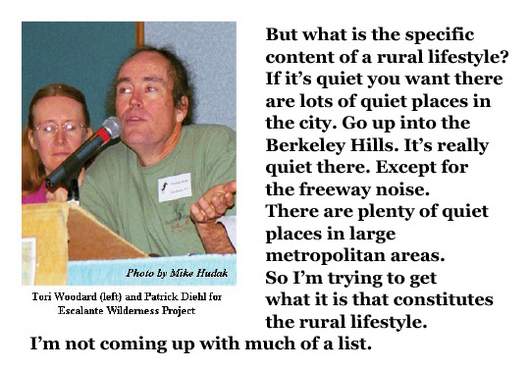
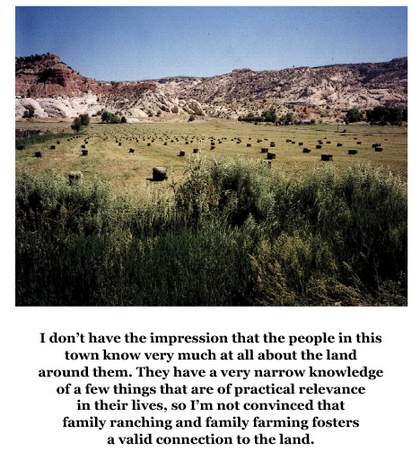
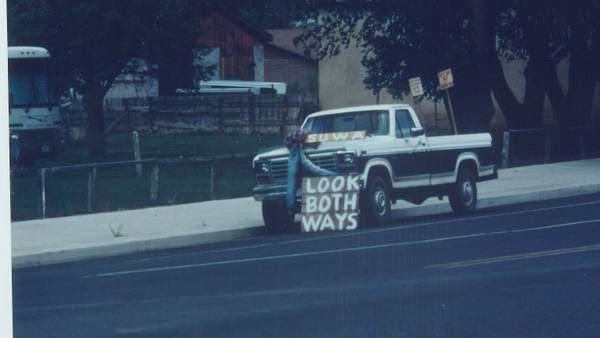
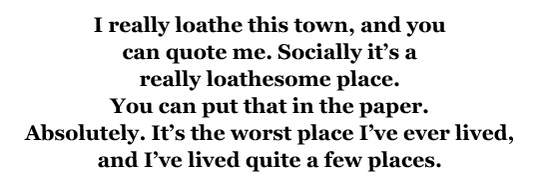
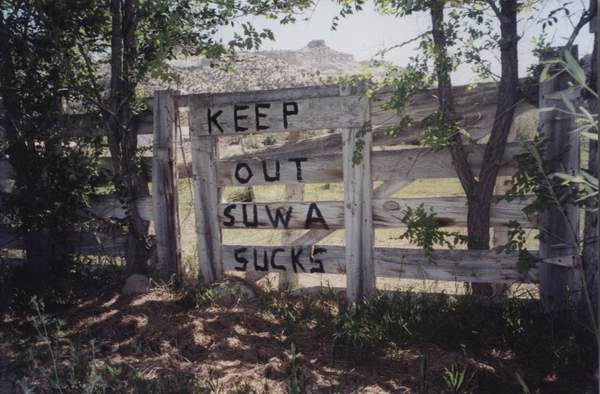
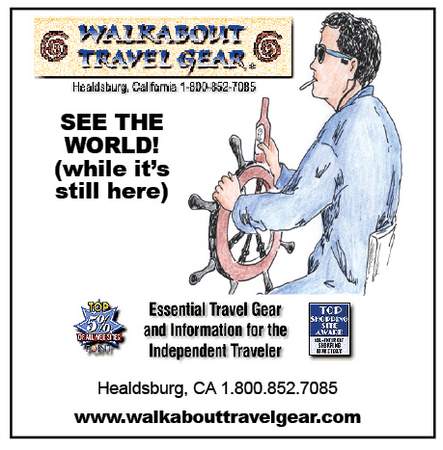
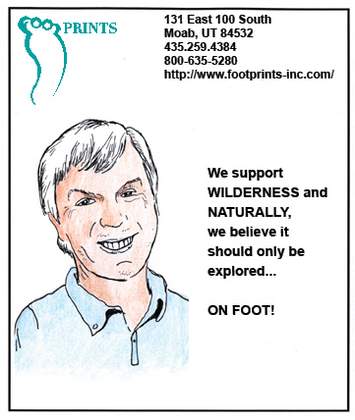
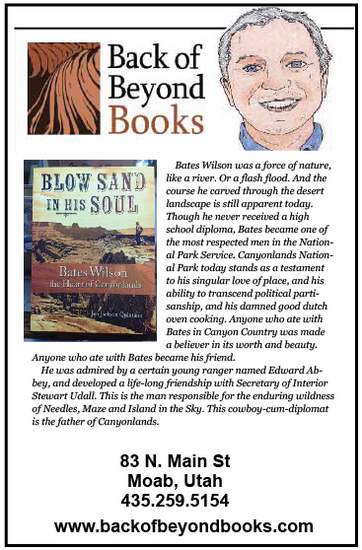
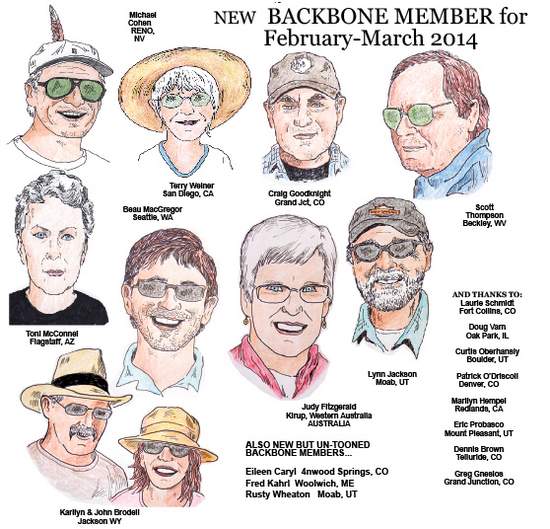
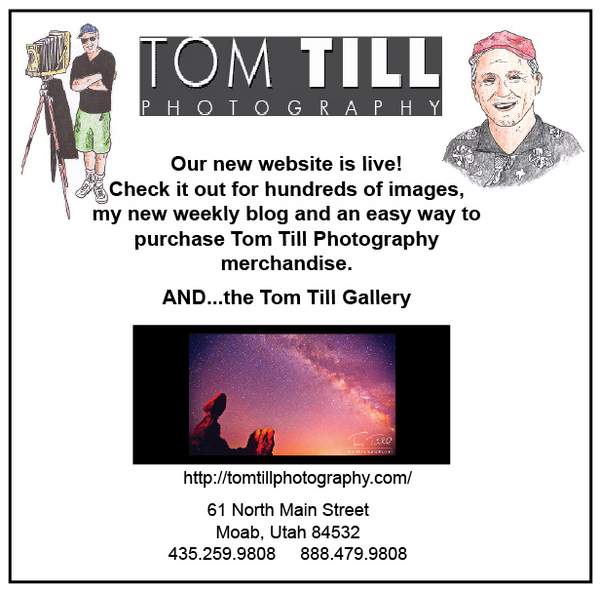
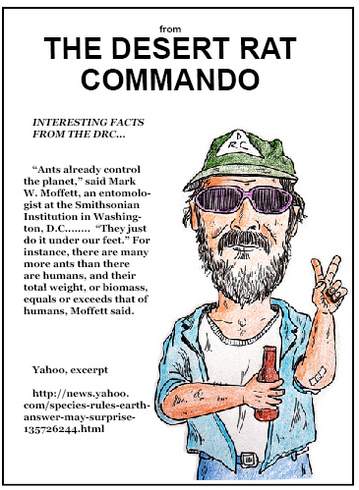
“Two of Utah’s most outspoken environmentalists…”
Really? I was thinking “Two of humanity’s incurable misanthropes’…. Utah should not saddle itself claiming them. One struggles to identify so much as one sign of a positive attitude in either. Pity
Thanks Ken…I wish there had been just one mainstream environmentalist in Utah willing to express your sentiments when the interview first ran, more than a decade ago.